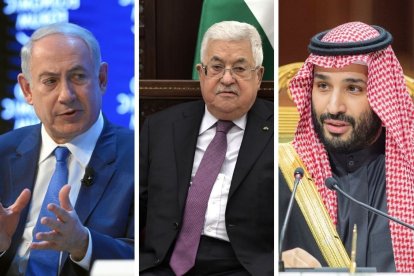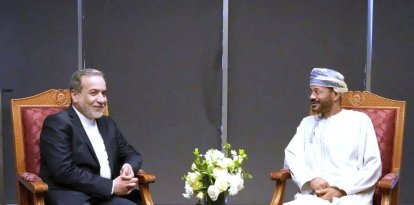There is a new Middle East: What will the Palestinians do?
The normalization of relations between Israel and Saudi Arabia is closer than ever. The time has come for the Palestinians to decide whether they prefer to continue behaving like capricious, disturbed and aggressive children who do more harm than good or choose to take the path of peace and progress once and for all.

Israel's Prime Minister Benjamin Netanyahu, Palestinian Authority President Mahmoud Abbas, and Saudi Arabia's Prince Mohammed bin Salman (World Economic Forum / Flickr-Voz Media-Wikimedia Commons)
There is a new reality in the Middle East, although we could say that it is no longer so new, but instead, it is being renewed. More and more countries in the Arab and Muslim world are normalizing their relations with Israel.
The Khartoum Resolution, signed in 1967 by eight Arab countries in Sudan, which included the three noes – no to peace with Israel, no to recognition of the State of Israel and no to negotiations with Israel – is being forgotten.
After Egypt, in 1979, and Jordan, in 1994, the United Arab Emirates was the first Arab country to normalize relations with Israel, and less than a month later Bahrain did the same. This is how the Abraham Accords emerged, which were signed by Israeli Prime Minister Benjamin Netanyahu and the Bahraini and Emirati foreign ministers in September 2020 in Washington. Then Morocco and Sudan joined the path of peace. Everything seems to indicate that Saudi Arabia will be next on the list, as Arab Prince Mohammed bin Salman recently said in statements to Fox and as Israeli Prime Minister Benjamin Netanyahu stated in his presentation to the United Nations Assembly. Normalizing relations with Saudi Arabia can create a domino effect in the region that could lead to more countries joining the new Middle East.
Furthermore, it is worth remembering that in September 2020 Kosovo and Israel recognized each other, and in 2021 the European country became the first with a predominantly Muslim population to open an embassy in Jerusalem. Although Kosovo does not yet have full international recognition, and not even the UN has yet accepted it as a member state, the treaty was a great step forward for both parties.
The most important reason for the agreements reached and those in process is the need to confront the Iranian threat, a concern shared by several Gulf countries and Jerusalem. But that's not the only reason. Despite past hostilities, Arab nations know that the Jewish state can no longer be wiped off the map and is there to stay. Defeating them is no longer a viable option. And if Israel is there, why not take advantage of that? After all, it is an advanced country in many areas, such as technology, science, agriculture and medicine.
The advances in the region may also be related to the new generations and the positive social changes that are taking place in some Islamic countries allied to the West. It is true that they still have a very long way to go in terms of individual freedoms, but the situation has improved.
We can confirm that the Israeli leader Golda Meir (1898-1978) was right when she said: “Peace will come when the Arabs love their children more than they hate us.” And that is indeed what is happening now in the Middle East. The Arabs began to care more about their well-being than their hatred. Of course, we don't forget that their well-being also depends on the weakening of Iran, which, although it is quite isolated, still has important support from Russia and China.
The Palestinians were used in the past as an excuse by Arab countries to oppose Israel. You don't have to be a scholar of Middle Eastern affairs to know this. But international politics is not static. It is constantly changing. Some conflicts end and others begin; some enemies become allies and vice versa. But this cynical use of the Palestinians is coming to an end. Therefore, the Palestinians have some important decisions to make.
Will Palestinian leaders continue to behave like capricious children who seek to obtain temporary pleasures through tantrums or will they understand that they must now mature to improve the situation of their people, if that's really what they want, even if it is to remain in power? The Hamas terrorist group acknowledges that they launch missiles against Israel to obtain certain benefits, such as millions of Qatari riyals and more Israeli work visas for Gazans. The Palestinian Authority keeps playing the role of the victim to continue receiving money from the world, including from Israel, and financing terrorists and their families.
What will the Palestinian leadership finally do? Will they begin to love their children more than they hate Israelis, or will Israel continue to deal with the corrupt and authoritarian Islamists of Hamas, who don't hide their desire to throw Jews into the sea, or with the corrupt and authoritarian Palestinian Authority, led by Mahmoud Abbas, who recently justified the Holocaust?
Palestinian leaders should accept what many Arab countries already understand and try to help their people by reaching an agreement with Israel (or at least try) and granting them freedom once and for all, thus abandoning the path of terrorism and increasingly less credible victimhood, even in the Islamic world.
People are sick and tired of Palestinian leaders. Many people I interviewed (Palestinians and Israelis), who have unofficial contact with Palestinian civilians, also told me that there are many people in the West Bank and Gaza who can't stand the corrupt and authoritarian leaders who govern them, and long for peace. However, they are afraid to speak out for fear of being arrested and tortured (in the best of cases), or even killed.
Israel has demonstrated and continues to demonstrate that it seeks peace and is willing to compromise and normalize relations with anyone willing to reach an agreement to improve the reality of the Middle East. This even includes those countries that previously wanted it to be destroyed.
Which side will the Palestinians choose? The side of peace and prosperity that is forming in the Middle East or that of poverty, war and destabilization, led by Tehran? Israel is ready for both. Whims no longer count; It's time for them to mature once and for all.
RECOMMENDATION





















